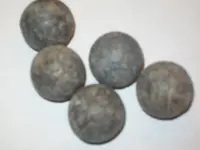High Plains Digger
Bronze Member
 I recently received these musket balls from a rock dealer who received them from another rock dealer (and so on) and was told they came from British Toronto from 1812. They do seem to be the right size (.70 +/-) but are a little inconsistent. I think I remember seeing musket balls from upstate NY somewhere that were not oxidized. I don't know if it is the dirt, or if they were found in water, or marsh, or what. Is it possible that 200 year old lead would still be grey? I would hate to offer these as British Brown Bess balls if they were made in someone's garage last March. Hopefully, some of our Upstate New York or Canadian brothers will give me a little input on this, as I am in way over my head. Thanks
I recently received these musket balls from a rock dealer who received them from another rock dealer (and so on) and was told they came from British Toronto from 1812. They do seem to be the right size (.70 +/-) but are a little inconsistent. I think I remember seeing musket balls from upstate NY somewhere that were not oxidized. I don't know if it is the dirt, or if they were found in water, or marsh, or what. Is it possible that 200 year old lead would still be grey? I would hate to offer these as British Brown Bess balls if they were made in someone's garage last March. Hopefully, some of our Upstate New York or Canadian brothers will give me a little input on this, as I am in way over my head. Thanks
Last edited:





 ...and I hope you are not one of them...
...and I hope you are not one of them...